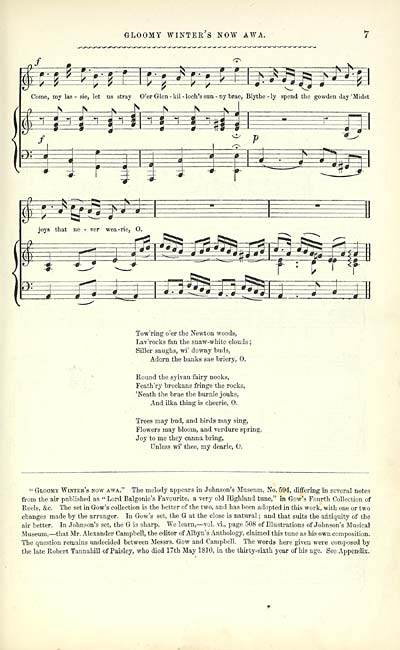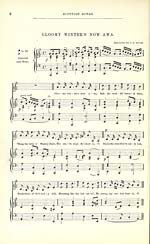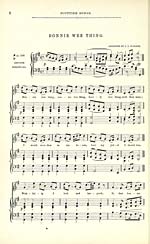Glen Collection of printed music > Printed music > Songs of Scotland > Volume 1
(19) Page 7
Download files
Complete book:
Individual page:
Thumbnail gallery: Grid view | List view

GLOOMY WINTERS NOW AWA.
/
zm
^r^ ^ m^ &
$
^e
*-fr * ^
Come, my las - sie, let us stray O'er Glen - kil - loch's sun - ny brae, Blythe - ly spend the gowden day 'Midst
js h k k is tk
m
i
iHi
~
3
3EI-E3
1
r
/
m
?
e?
■J
^-— g:
sfe^fesS:
s
s
joys that ne - ver wea-rie, O,
wm
^^ ife
ai
S
^§1
Tow'ring o'er the Newton woods,
Lav'rocks fan the snaw-white clouds ;
Siller saughs, wi' downy buds,
Adorn the banks sae briery, 0.
Round the sylvan fairy nooks,
Feath'ry breckans fringe the rocks,
'Neath the brae the burnie jouks,
And ilka thing is cbeerie, 0.
Trees may bud, and birds may sing,
Flowers may bloom, and verdure spring,
Joy to me they canna bring,
Unless wi' thee, my dearie, 0.
" Gloomy Winter's now awa." The melody appears in Johnson's Museum, No. 594, differing in several notes
from the air published as " Lord Balgome's Favourite, a very old Highland tune," in Gow's Fourth Collection of
Reels, &c. The set in Gow's collection is the better of the two, and has been adopted in this work, with one or two
changes made by the arranger. In Gow's set, the G at the close is natural ; and that suits the antiquity of the
air better. In Johnson's set, the G is sharp. We learn, — vol. vi., page 508 of Illustrations of Johnson's Musical
Museum, — that Mr. Alexander Campbell, the editor of Albyn's Anthology, claimed this tune as his own composition.
The question remains undecided between Messrs. Gow and Campbell. The words here given were composed by
the late Robert Tannahill of Paisley, who died 17th May 1810, in the thirty-sixth year of his age. See Appendix.
/
zm
^r^ ^ m^ &
$
^e
*-fr * ^
Come, my las - sie, let us stray O'er Glen - kil - loch's sun - ny brae, Blythe - ly spend the gowden day 'Midst
js h k k is tk
m
i
iHi
~
3
3EI-E3
1
r
/
m
?
e?
■J
^-— g:
sfe^fesS:
s
s
joys that ne - ver wea-rie, O,
wm
^^ ife
ai
S
^§1
Tow'ring o'er the Newton woods,
Lav'rocks fan the snaw-white clouds ;
Siller saughs, wi' downy buds,
Adorn the banks sae briery, 0.
Round the sylvan fairy nooks,
Feath'ry breckans fringe the rocks,
'Neath the brae the burnie jouks,
And ilka thing is cbeerie, 0.
Trees may bud, and birds may sing,
Flowers may bloom, and verdure spring,
Joy to me they canna bring,
Unless wi' thee, my dearie, 0.
" Gloomy Winter's now awa." The melody appears in Johnson's Museum, No. 594, differing in several notes
from the air published as " Lord Balgome's Favourite, a very old Highland tune," in Gow's Fourth Collection of
Reels, &c. The set in Gow's collection is the better of the two, and has been adopted in this work, with one or two
changes made by the arranger. In Gow's set, the G at the close is natural ; and that suits the antiquity of the
air better. In Johnson's set, the G is sharp. We learn, — vol. vi., page 508 of Illustrations of Johnson's Musical
Museum, — that Mr. Alexander Campbell, the editor of Albyn's Anthology, claimed this tune as his own composition.
The question remains undecided between Messrs. Gow and Campbell. The words here given were composed by
the late Robert Tannahill of Paisley, who died 17th May 1810, in the thirty-sixth year of his age. See Appendix.
Set display mode to: Large image | Transcription
Images and transcriptions on this page, including medium image downloads, may be used under the Creative Commons Attribution 4.0 International Licence unless otherwise stated. ![]()
| Special collections of printed music > Glen Collection of printed music > Printed music > Songs of Scotland > Volume 1 > (19) Page 7 |
|---|
| Permanent URL | https://digital.nls.uk/90411830 |
|---|
| Shelfmark | Glen.214 |
|---|---|
| Additional NLS resources: | |
| Attribution and copyright: |
|
| Description | Scottish songs and music of the 18th and early 19th centuries, including music for the Highland bagpipe. These are selected items from the collection of John Glen (1833 to 1904). Also includes a few manuscripts, some treatises, and other books on the subject. |
|---|
| Description | The Glen Collection and the Inglis Collection represent mainly 18th and 19th century Scottish music, including Scottish songs. The collections of Berlioz and Verdi collected by bibliographer Cecil Hopkinson contain contemporary and later editions of the works of the two composers Berlioz and Verdi. |
|---|

